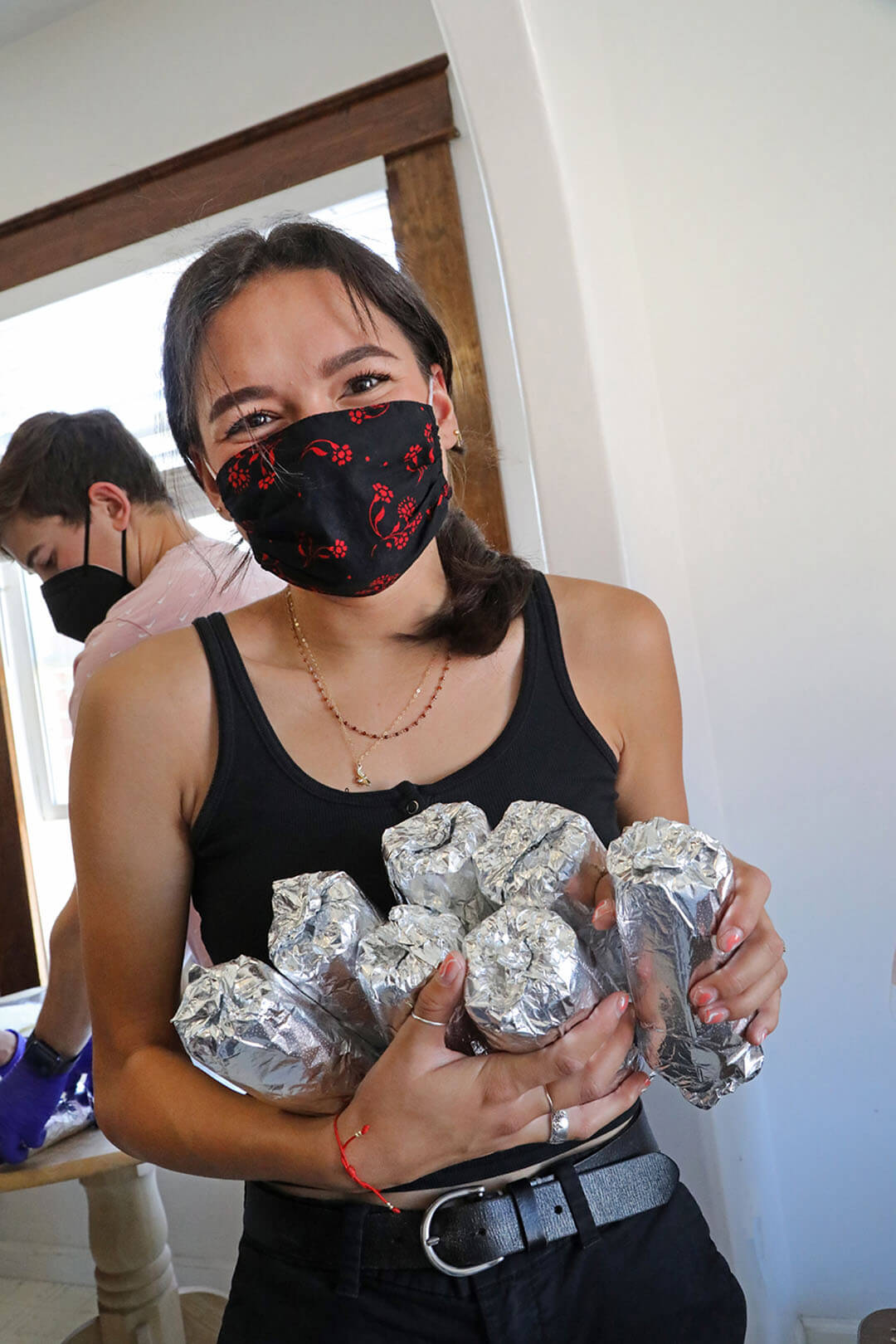Local organizations come together to ease hunger in Northern Nevada and Lake Tahoe.
Many dining tables and kitchen countertops will overflow with food and drink for family, friends, and guests alike this holiday season. As some say grace over this abundance, others may find another thought entering their minds at the final “amen”: a gnawing Dickensian perspective that wonders what the table might look like in other homes or shelters.
Because as some feast this holiday season, others are more likely to starve.
Before the COVID-19 pandemic, more than 50,000 people faced food insecurity in Washoe County — about one in every 10 people, according to the Feeding America’s Map the Meal Gap study. Then the 2020 shutdown to address the spread of the virus led to a staggering increase in unemployment and the need for nutrition services, according to the 2020 Nevada Food Security Report, prepared by the Nevada Department of Health and Human Services.
“Food insecurity is so layered,” says Susan Abele, co-founder and president of the Reno Gastro Project. “For some, it’s more permanent, and for some, it’s semi-permanent. There are people in our community who may have homes and may even be employed, but they may also be one paycheck away from not being able to buy groceries that week.”
As statewide food security partners faced unprecedented challenges to feed individuals with food insecurity, existing organizations and new groups rallied to help.
“Whenever there’s an economic crisis or a period of social unrest, you can see that community gardens, urban agriculture, small-scale community-based food systems begin to become important and start to be built,” says Lyndsey Langsdale, president and farm manager of Reno Food Systems.
However, these organizations’ efforts and missions did not cease as the calendar changed and vaccines became available. Instead, their leaders, staffs, and volunteers carried on, striving to help their neighbors who would be disproportionately impacted by this epidemic of hunger — including racial and ethnic minorities, seniors, individuals with chronic diseases, and people experiencing poverty.
As a new year approaches, these same people continue to work to feed the hungry and help eliminate food insecurity in our community.
Hungry for Help
After coming together in 2020 in response to COVID-19, members of the Food Security Coalition of Northern Nevada have continued to support regional farms and address the rising food insecurity associated with the broader economic downturn resulting from the pandemic.
An alliance of organizations working to combat food insecurity and support local agricultural producers, the coalition distributed 2 million pounds of food to families in need in 2020.
“It felt like in 2020 we were in a desperate situation,” says Kelli Kelly, executive director of the Fallon Food Hub and a member of the Food Security Coalition of Northern Nevada. “Fortunately, there was a lot of grant funding to help organizations like ours step up and make a large impact on combating food insecurity in our region, especially tied to the coronavirus pandemic.”
Partner organizations in the Food Security Coalition range from farms and food hubs to food pantries, and include the University of Nevada, Reno’s Desert Farming Initiative, Soulful Seeds, Fallon Food Hub, Catholic Charities, UNR Pack Provisions, Community Health Alliance, Flint Street Farm, Reno Food Systems, Healthy Communities Coalition, and the Food Bank of Northern Nevada.
“We don’t want to duplicate efforts,” says Earstin Whitten, president, co-founder, and executive director of Soulful Seeds. “We wanted to draw on the experience and connections these individuals have to make sure that people get healthy food.”
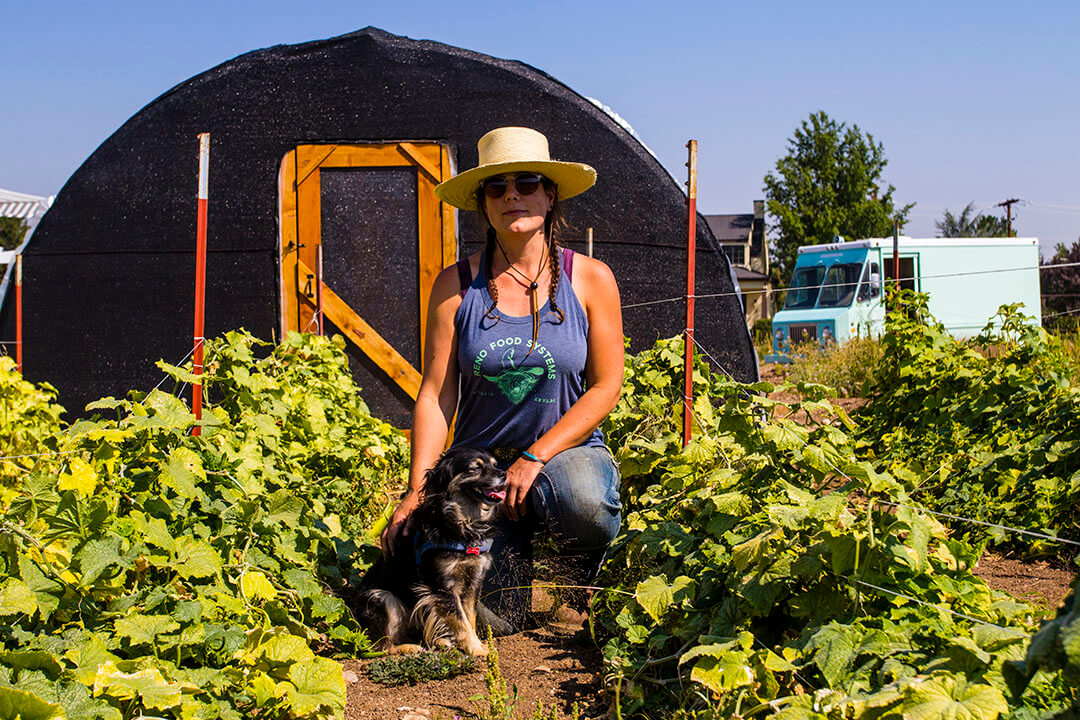
One of the coalition’s significant projects supports local farmers and growers in the region while feeding the hungry. Leaders in the Farmers Market Gleaning Program ensure that fresh, nutrient-dense produce from farmers’ markets that does not sell will end up in the mouths of those who need it rather than in a landfill. By purchasing leftover produce at wholesale prices from farmers at the end of each weekly farmers’ market, managers at Reno Food Systems are then able to re-distribute it to 12 community partners. As a result, small farmers and managers of pantries and community kitchens all benefit from access to fresh produce.
“What’s mind-boggling to me is that anybody goes hungry, especially in this region where we’re so close to where so much of the world’s food is produced,” Langsdale says. “It’s ridiculous when there’s so much of it that gets turned away.”
The coalition members strive to bring equity to the food system, says Cortney Bloomer, food systems manager for the Rural Health and Nutrition Initiative, the food systems development arm of Healthy Communities Coalition.
“Fresh food and healthy food shouldn’t be a privilege,” Bloomer says. “It’s something that should be made available to everybody.”
A Double Serving of Support
There’s an unsavory irony that the economic turmoil wrought by the pandemic had such a disastrous impact on the food security of those in the restaurant industry. Before the pandemic, more than 25 percent of Nevada’s labor force worked in the leisure and hospitality industry, which was forced to shut down early in March 2020. Many individuals lost their jobs; Nevada’s statewide unemployment peaked above 30 percent in April 2020. The doors of dozens of longtime local favorite businesses permanently closed amid restrictions and stay-at-home orders.
But during this gastronomical demise, Reno Gastro Project founders and volunteers saw an opportunity to feed both the hungry and the finances of struggling restaurants. Founded in 2020, the group purchases full-priced meals from restaurants and then provides those dishes to families facing food insecurity.
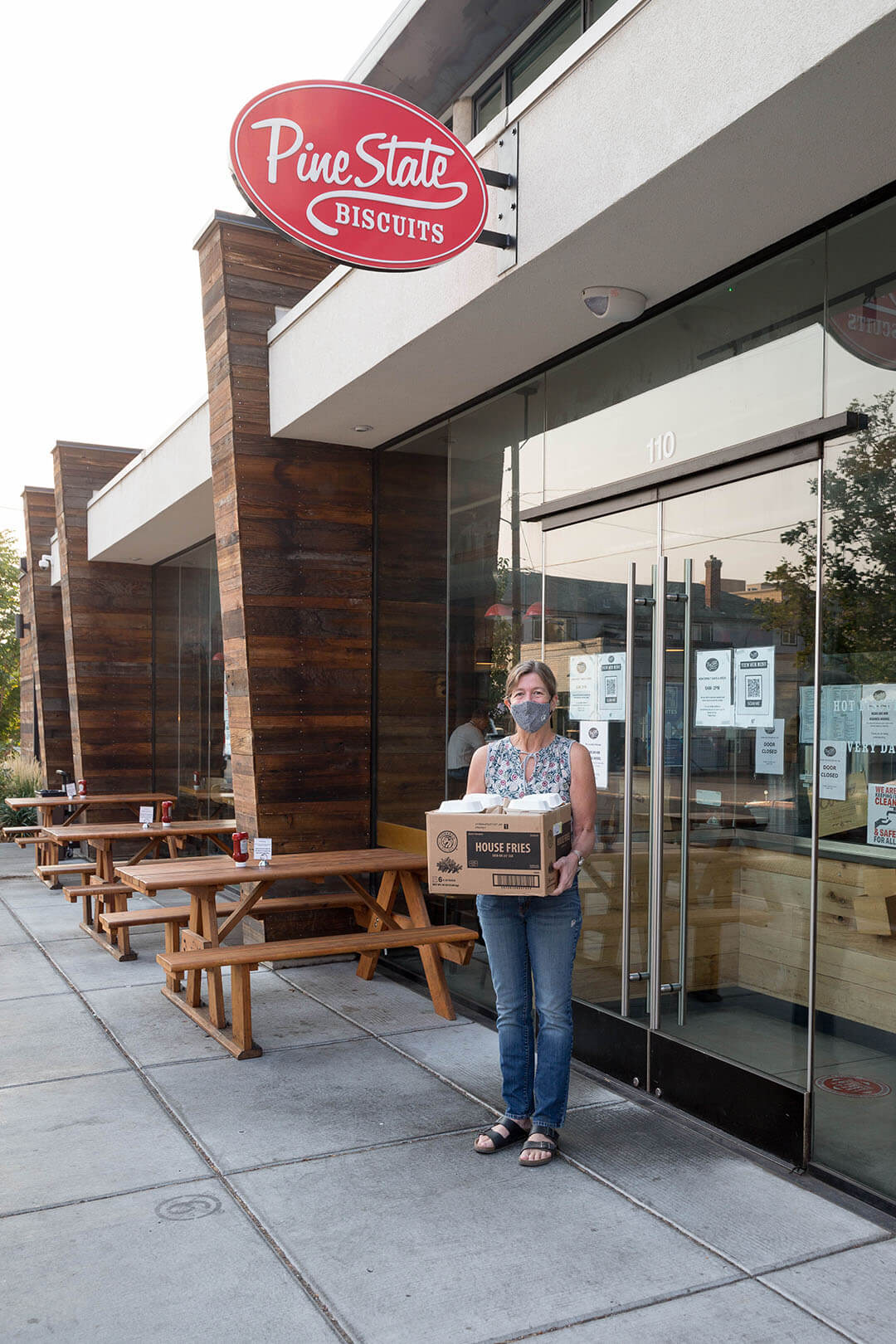
“It’s not an overly complicated concept, and that’s the beauty of it,” Abele says.
So far, the project managers have purchased and donated 1,700 meals to residents of Eddy House, a nonprofit whose mission is to help homeless and at-risk youths develop life and job skills necessary for sustainable independence.
In 2022, managers at the project hope to expand their reach to other organizations.
“It’s kind of cheesy, but our acronym could be Reno GAP, for gastro project,” Abele says. “We do want to fill the gaps and work with the community.”
Wrapped Up with Care
About a month after he tried his first burrito, Blaize Abuntori had a revelation: This hot, nutrient-dense, comforting bundle would be the perfect food to distribute to those in need in Downtown Reno. So Abuntori, then a graduate student in statistics and data science at UNR, bought four burritos from Beto’s Mexican Food in Reno and gave them out to people who were hungry.
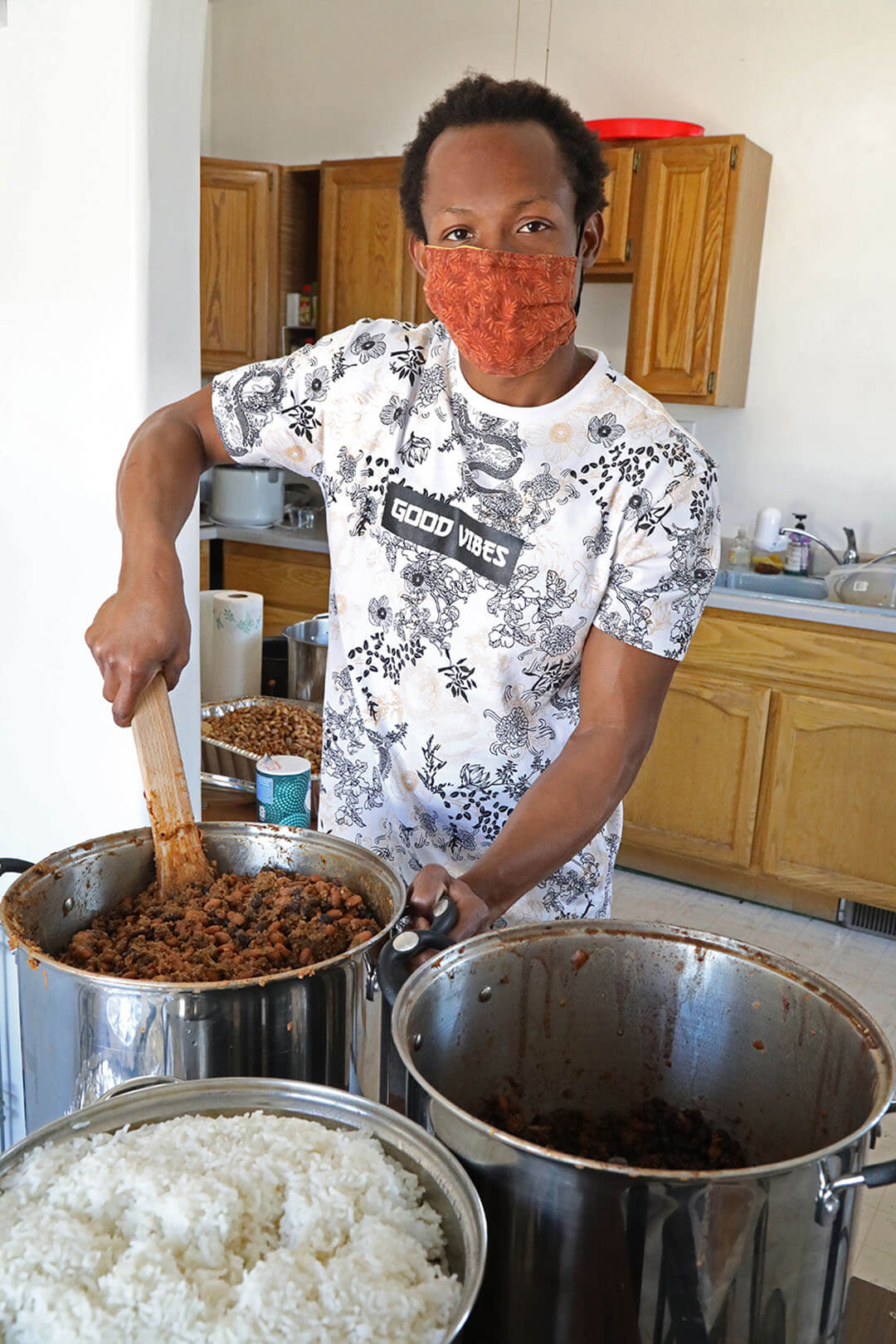
More than a year later, those four burritos multiplied when Abuntori founded Reno Burrito Project in April 2020. Now, he and a group of 20 to 30 volunteers cook and hand out almost 500 burritos every Sunday to individuals in need near Downtown Reno.
“There hasn’t been a single Sunday where we haven’t done this project and successfully handed out hundreds of burritos, hundreds of water bottles, and other non-perishable foods and essential supplies to folks in Downtown Reno, and now at the Nevada CARES Campus,” says Ulyses “Uly” Dorantes, communications director for Reno Burrito Project.

Since those early days of the pandemic when the project was founded, group volunteers have handed out more than 20,000 burritos. Now they’re looking to expand the project’s offerings to include hygiene packets. In the meantime, the group relies on its dedicated volunteers to keep bringing the burritos.
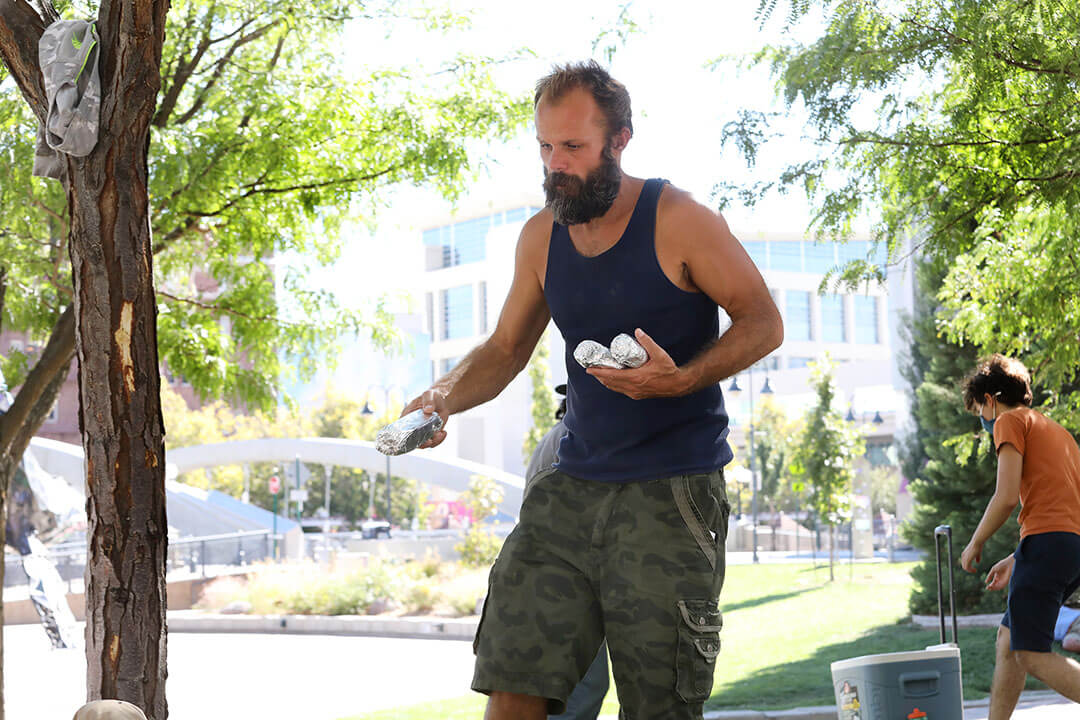
“We’re a very welcoming group,” says Spence Banda, Reno Burrito Project’s chief procurement officer. “We just want people to show up and come have a good time and do some good for the community.”
Nourishment by the Bag
In South Lake Tahoe, the nonprofit, all-volunteer organization Bread & Broth has continued to pursue its mission to ease hunger in the community.
For more than 30 years, Bread & Broth has provided hot meals and groceries to those in need. But in the face of the COVID-19 pandemic, the organization’s volunteers modified their regular services to keep their clients safe.
Instead of hot meals served on Monday and Friday, Bread & Broth volunteers distributed bags of groceries — including bread, eggs, butter, milk, fruits, vegetables, and staples. For individuals experiencing homelessness, Bread & Broth volunteers offer food items that do not require cooking appliances or refrigeration.
In the last 18 months, volunteers have distributed an average of 1,000 bags each week, touching the lives of more than 670 people weekly.
“I think the thing we were most proud of during 2020 is that we continued to provide food for those in need during the pandemic,” Beth Wallace, the organization’s communications chair, wrote in an email while evacuating her home due to the Caldor Fire in early September 2021. “There was not a day we missed in providing groceries to our community members.”
Continuing the Fight Against Hunger
In the upcoming year, managers and volunteers at each of these organizations and dozens of others will continue their work to ensure that no one in the Reno-Tahoe community goes hungry. But to do so, they need the support of volunteers, donors, and supporters.
“What we’re doing in the Food Security Coalition is exchanging ideas around these big, hard questions,” says Jill Moe, director of the Desert Farming Initiative at UNR. “It’s all of our responsibility to look around and decide this is unacceptable, and ask what we can personally do about it.”
Resources
All the organizations mentioned in this article depend on generous donations of time, funds, and resources to support their work. Here’s where you can learn more about each and get involved:
Bread & Broth
Breadandbroth.org
Desert Farming Initiative
Naes.unr.edu/dfi
Fallon Food Hub
775-234-8816 • Fallonfoodhub.com • Fallonfoodhub@gmail.com
Healthy Communities Coalition
Healthycomm.org
Reno Burrito Project
Renoburritoproject.com • Renoburritoproject@gmail.com
Reno Food Systems
Renofoodsystems.org • Info@renofoodsystems.org
Reno Gastro Project
775-453-0022 • Renogastroproject.org • Info@renogastroproject.org
Rural Health and Nutrition Initiative
Healthycomm.org/food-hub/rhni
Soulful Seeds
775-771-2317 • Soulful-seeds.com • Soulfulseedsnnevada@gmail.com
